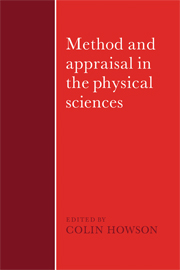Book contents
- Frontmatter
- Contents
- Editorial preface
- History of science and its rational reconstructions
- Atomism versus thermodynamics
- Thomas Young and the ‘refutation’ of Newtonian optics: a case-study in the interaction of philosophy of science and history of science
- Why did oxygen supplant phlogiston? Research programmes in the Chemical Revolution
- Why did Einstein's Programme supersede Lorentz's?
- The rejection of Avogadro's hypotheses
- On the critique of scientific reason
- Index of Names
Why did oxygen supplant phlogiston? Research programmes in the Chemical Revolution
Published online by Cambridge University Press: 04 August 2010
- Frontmatter
- Contents
- Editorial preface
- History of science and its rational reconstructions
- Atomism versus thermodynamics
- Thomas Young and the ‘refutation’ of Newtonian optics: a case-study in the interaction of philosophy of science and history of science
- Why did oxygen supplant phlogiston? Research programmes in the Chemical Revolution
- Why did Einstein's Programme supersede Lorentz's?
- The rejection of Avogadro's hypotheses
- On the critique of scientific reason
- Index of Names
Summary
Imre Lakatos showed how different philosophies of science provide different analytical tools with which to approach the history of science. And he showed how different philosophies of science could be evaluated by seeing how well they account for episodes in the history of science. In this paper I shall reconsider a very famous episode in the history of science, the Chemical Revolution, and argue that Lakatos's methodology of scientific research programmes provides the best account of it. I will first outline the accounts of the Chemical Revolution given by other methodologies, and show that they are unsatisfactory: each of them must either deem the Chemical Revolution an irrational affair or falsify history so that it squares with its canons of rationality. Then I will argue that the actual story of the Chemical Revolution fits Lakatos's methodology like a glove.
We all know that it is easy to find ‘confirmations’ of a scientific theory if you look for them. Similarly, it is easy to find ‘confirmations’ of a methodology if you look for them in the history of science. So perhaps it is worth mentioning that I first become interested in the Chemical Revolution in order to try to refute Lakatos's methodology. The conclusions I have reached about the Chemical Revolution do not square with the preconceptions I had at the outset. And while I have been, and still am, critical of some features of Lakatos's methodology, they are not features which need concern us here.
- Type
- Chapter
- Information
- Method and Appraisal in the Physical SciencesThe Critical Background to Modern Science, 1800–1905, pp. 181 - 210Publisher: Cambridge University PressPrint publication year: 1976
- 63
- Cited by

